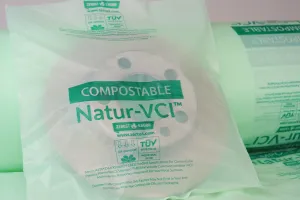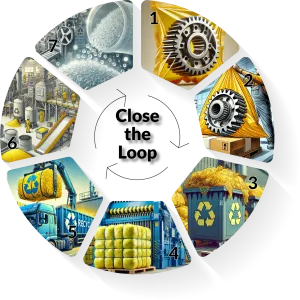 Sustainability has become a core expectation across modern industries. As this shift continues, the importance of clear, accurate environmental claims is greater than ever. In the corrosion prevention sector, discussions around biodegradable and compostable packaging are increasing, and with them, the risk of misunderstanding or misapplying scientific terms. Many people call this greenwashing, using environmental claims without clear or sufficient evidence.
Sustainability has become a core expectation across modern industries. As this shift continues, the importance of clear, accurate environmental claims is greater than ever. In the corrosion prevention sector, discussions around biodegradable and compostable packaging are increasing, and with them, the risk of misunderstanding or misapplying scientific terms. Many people call this greenwashing, using environmental claims without clear or sufficient evidence.
At NTIC/ZERUST®, we believe transparency and scientific validation should be the foundation of sustainability efforts. That’s why we’re examining how companies present claims in VCI packaging and exploring ways our industry can build trust and accountability.
Clarifying the Role of Biodegradability in Landfill Conditions
The U.S. Federal Trade Commission (FTC) provides specific guidance on how “biodegradable” claims should be used. To meet these criteria, a product must break down into natural elements within one year after typical disposal. However, many landfills are anaerobic environments, meaning they lack oxygen and the microbial conditions necessary for effective biodegradation, even for organic materials like food waste.
Biodegradability Tests and the Risk of Greenwashing
Some companies cite test methods like ASTM D5511 and ASTM D5526 to support their biodegradability claims. While these methods simulate decomposition under controlled conditions, they do not pass/fail certification standards and do not always reflect real-world landfill performance. In fact, ASTM withdrew D5526 in 2025 due to concerns about outdated assumptions and frequent misinterpretation.
Using data correctly and reporting clearly helps avoid confusion and ensures claims reflect real environmental results.
Avoiding Greenwashing with Validated Sustainability Claims

At NTIC, we focus on third-party-verified data and recognized standards. TÜV Austria certified our ZERUST® Natur-VCI® film as 100% compostable, meeting internationally respected specifications, including ASTM D6400 and EN 13432. It also passes the NACE TM0208 standard for VCI performance, confirming that sustainability and effective corrosion protection can go hand in hand.
We designed Natur-VCI® to biodegrade in industrial composting environments without releasing toxic residue or microplastics, offering users a reliable and environmentally responsible solution.
Considering the Broader Context of Compostable Packaging

Compostable films offer significant promise. However, these films don’t work for every application. These materials can carry higher costs and often have a shorter shelf life than traditional polyethylene films. In the U.S., most composting facilities process only food-related waste and accept packaging only if it is fully compostable. Otherwise, it may still end up in landfills, despite best intentions.
To address these limitations, we also offer the ZeCycle recycling program. This initiative reintegrates used ZERUST® films into new ZERUST® ICT®510-PCR30 Post-Consumer Recycled (PCR) VCI Films, helping close the loop through circular packaging solutions.
Moving Forward with Clarity and Integrity
At NTIC, we communicate our environmental practices honestly and base them on scientific evidence. Buzzwords can be tempting. But true sustainability depends on facts, transparency, and understanding a product’s full lifecycle.
We invite you to explore how our approach avoids greenwashing and promotes long-term environmental responsibility.
Click here to read our full technical response and learn more about how we approach sustainability with integrity and care, avoiding greenwashing through verified science.

